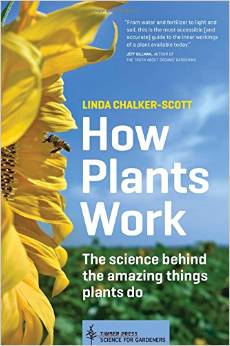Solving The Mystery Of Good Gardening
By George Graine, Fairfax Master Gardener
 How Plants Work: The Science Behind Amazing Things Plants Do
How Plants Work: The Science Behind Amazing Things Plants Do
By Dr. Linda Chalker-Scott
Timber Press, 2015
If you are curious as to how and why plants respond to different environmental stressors, then “How Plants Work: The Science Behind Amazing Things Plants Do” is a near-perfect antidote. The book by Dr. Linda Chalker-Scott, an associate professor and extension urban horticulturalist at Washington State University, explains various plant phenomena in useful, understandable ways and further clarifies the information with color photos and illustrations adjacent to the text.
According to Chalker-Scott, “What we gardeners most want to know is how plants work so that we can have gardens and landscapes that are healthy, beautiful, and don’t need constant attention for fertilizers and pesticides.” Can I hear an amen for that quote? Furthermore, Chalker-Scott recognizes that most gardeners are not scientists; she therefore writes about science without detailed jargon so that a gardener’s inquiring mind will usually be satisfied with answers on many practical topics.
Gardening the “right way” will often save you time and money, but you need to set aside some past practices. Often these have been handed down and even described in books that are out-of-date and can best be described as myths. A full-service garden center often has a garden “apothecary” full of all kinds of potions and is surely willing to sell unneeded products for the garden. Chalker-Scott makes many excellent points to help stop this nonsense. Below are 10 garden myths that are worth exploring. All of them and others are clearly explained in her book.
- Vitamin B1 for transplants
- Epsom salts
- Biostimulants
- Amending soil before planting trees and shrubs
- Landscape fabric (geotextile, weed barrier)
- Gypsum
- Compost tea
- Water crystals (hydrogel)
- Antitranspirants
- The season for tree planting
Even if you have been paying only scant attention to garden media (newspaper, TV, radio), you must have read or heard something like this: GET A SOIL TEST! Do your eyes roll and perhaps tune out this advice? Chalker-Scott expounds on why this is an essential requirement. Perhaps best put in human terms, getting a soil test is something like having your blood tested in order to find out which things are right and which are recommended for change. In a similar vein (no pun intended), a soil test will determine which nutrients are in sufficient amount and which need to be supplemented. Note that an excess of nutrients could be toxic to plants much the same as an excess of some vitamins could be harmful to a human. Thus, it makes sense to have your soil tested before you fertilize turf, vegetables, or other parts of your landscape. (For more on soil testing, see The Scoop on Dirt.)
It is important to spend more words on this vital topic because much of your garden success is dependent on the composition of your soil. Have your soil tested at a laboratory such as the one at Virginia Tech, our land grant college in Blacksburg. Soil test kits are available at plant clinics operated by Fairfax Master Gardeners and at public libraries in Fairfax County. In Virginia, the fee for soil testing is $10, a small price when you consider the money spent on your plant material. Let’s get off the soil-test soap box, even though Chalker-Scott has a lot more information about this topic.

Dr. Linda Chalker-Scott
In summary, this book reveals the science of plants with understandable writing and information that will help and perhaps change the way you interact with your gardens. Chalker-Scott is a fine teacher, and we can learn a lot from her. (For more of her essays, see her website, Horticultural Myths and the blog, The Garden Professors.) In “How Plants Work,” Chalker-Scott provides the what and why of gardening to achieve the best results. Your garden will thank you for reading it, even if it does not speak in words.